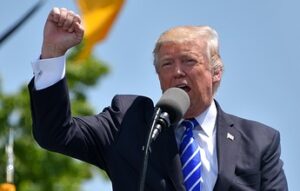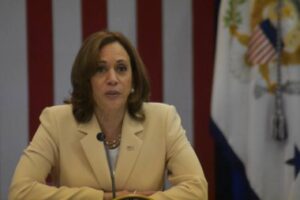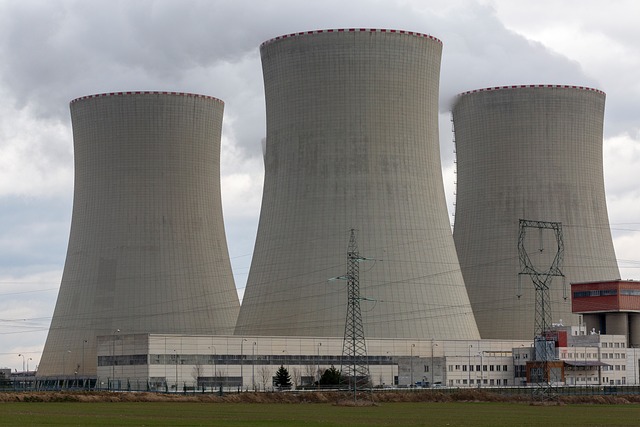
Trump or Harris: Who is the Better Candidate for the Financial World?
In the ever-turbulent world of U.S. politics, the 2024 presidential election has once again captured global attention. Two prominent names dominate the discussions: Donald Trump and Kamala Harris. Both candidates not only represent different political ideologies but also distinct visions for the future of the American economy and financial world. While Trump campaigns on his business experience and a platform of deregulation and tax cuts, Harris emphasizes a progressive economic policy focused on social justice and sustainability. In this article, we will explore the economic policies of both candidates and analyze which one may be better suited for the financial world.
Donald Trump: A Business-Friendly Approach Deregulation and Tax Policy
Donald Trump, during his first term as President, pursued an economic policy centered around deregulation and tax cuts. One of his most notable achievements was the passage of the Tax Cuts and Jobs Act of 2017. This legislation reduced the corporate tax rate from 35% to 21%, promising to stimulate economic growth by encouraging businesses to invest more and create jobs.
Market-Friendly Measures
Trump’s deregulation policies were particularly popular among financial markets. He pushed for the rollback or weakening of numerous regulations introduced under the Obama administration, such as parts of the Dodd-Frank Act, which had been enacted in response to the 2008 financial crisis. By reducing regulatory hurdles, Trump created a more business-friendly environment, which led to a rise in stock markets.
Trade War with China
However, Trump’s economic record was not without its challenges. His trade war with China created uncertainties in global markets. The imposition of tariffs and subsequent retaliatory measures negatively impacted many U.S. businesses, particularly in agriculture and manufacturing. Nevertheless, some argue that Trump’s tough stance on China was necessary to address unfair trade practices and protect America’s economic interests.
Kamala Harris: A Progressive Vision Economic Justice and Taxation

Kamala Harris promotes an economic vision that is heavily focused on social justice and sustainability. She supports higher taxes on wealthy individuals and large corporations to fund social programs and infrastructure investments. Harris argues that extreme inequalities in the U.S. can only be addressed through a fairer tax policy and targeted support for the middle and lower classes.
Sustainable Development
A central element of Harris’s economic policy is her focus on sustainability and green transition. She advocates for massive investments in renewable energy and sustainable technologies, which are intended to bring long-term ecological and economic benefits. Her support for the Green New Deal reflects her commitment to creating jobs in green technologies and combating climate change.
Regulation and Consumer Protection
In contrast to Trump, Harris supports stricter regulation of financial markets. She argues that Trump’s deregulation policies opened the door to a new financial crisis by enabling risky business practices. Harris aims to ensure that financial markets remain stable and transparent to protect consumers and the broader economy.
Who is Better for the Financial World?
Short-Term Gains vs. Long-Term Stability
The question of which candidate is better for the financial world largely depends on whether one prioritizes short-term gains or long-term stability. Trump’s policies have undeniably led to a swift increase in stock markets, which has pleased investors. His deregulation and tax cuts have boosted corporate profits and spurred economic growth in the short term.
On the other hand, many argue that Harris’s approach would create a more sustainable and equitable economy. Her plans for higher taxes and increased regulation might be perceived as burdensome for businesses in the short run, but could lead to a more stable economy in the long term by reducing inequality and investing in sustainable industries.
ipsum dolor sit amet, consectetur adipiscing elit. Ut elit tellus, luctus nec ullamcorper mattis, pulvinar dapibus leo.
Impact on International Relations
The international dimension also plays a significant role. Trump’s unpredictable foreign policy and trade wars have led to uncertainties in global markets. Harris, on the other hand, could offer a more stable and predictable foreign policy, which might strengthen international confidence and have positive effects on global markets.
Social Responsibility and Investor Expectations
Another important aspect is the growing importance of social responsibility for investors. More and more investors are placing value on environmental, social, and governance (ESG) criteria. Harris’s commitment to social justice and sustainability might be more attractive to this group of investors in the long term.
Conclusion
The choice between Donald Trump and Kamala Harris as the better candidate for the financial world depends greatly on one’s priorities and values. Trump’s policies offer short-term economic gains through deregulation and tax cuts but come with risks of long-term instability and trade conflicts. Harris, on the other hand, promises a fairer and more sustainable economic policy that could lead to greater long-term stability and social equity, albeit with potential short-term challenges for businesses.
For investors and businesses seeking immediate returns, Trump might be the preferable choice. For those prioritizing long-term stability, social justice, and sustainability, Harris could be the more suitable candidate. Ultimately, the outcome of the election will have profound implications for the financial world, and the decision rests with voters who must choose which vision for the future they support.


